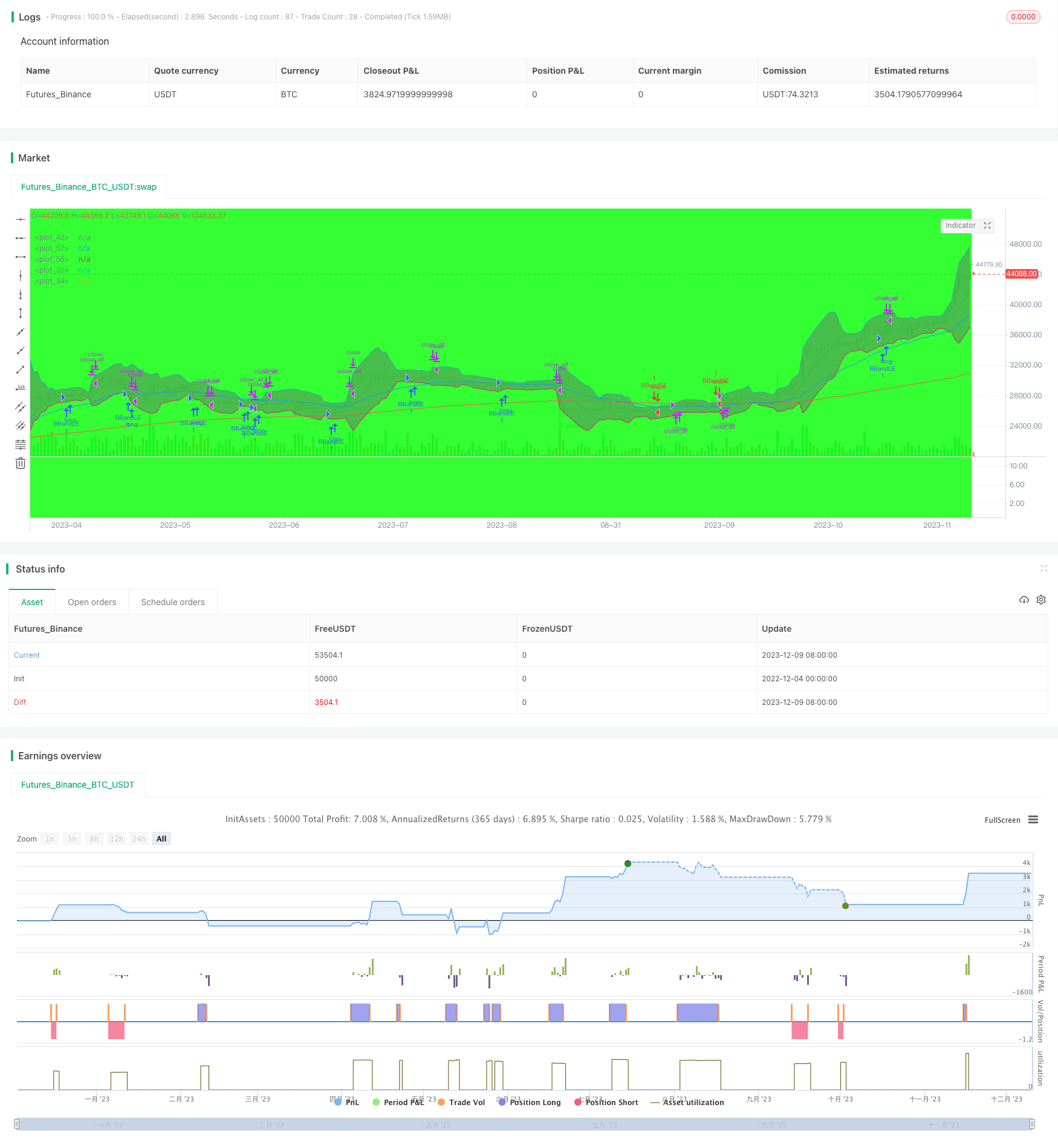
概述
该策略通过计算两条不同周期的指数移动平均线(EMA)来判断市场趋势方向,在趋势方向确定的前提下,结合自适应布林带来发现超买超卖机会,实现趋势跟踪交易。
策略原理
计算200周期和30周期EMA,200EMA大于30EMA判断为长线趋势向上,否则判断为长线趋势向下。
在确定趋势方向后,计算布林带的基线、上轨和下轨。基线采用可配置周期(如8周期)的SMA,带宽采用同周期最高价和最低价的极差的可配置倍数(如1.3和1.1)。
在长线向上时,当价格由下向上突破下轨时,判断为买点;在长线向下时,当价格由上向下突破上轨时,判断为卖点。
为过滤假突破,在发生突破时检查前一根K线的变动率是否小于可配置值(如3%),同时检查布林带上下轨间是否大于可配置距离要求(如2.2%)。
在开仓后设定可配置的止损(如3%)和止盈(如10%),以锁定盈利。
策略优势
双EMA判断主趋势,避免在主趋势不明时无序开仓。
自适应布林带设定开仓点,根据趋势自动调整带宽参数,进一步锁定趋势。
变动率和最小带宽检查机制有效过滤假突破。
止损止盈设置合理,锁定盈利风险可控。
策略风险
双EMA无法准确判断转折点,可能错过趋势转折机会。
布林带参数设置不当可能导致虚假信号。
固定止损止盈难以适应市场波动。
优化方向
结合其他指标判断趋势,确定主次趋势转换点。
采用动态调整布林带参数的方法。
设置条件单止盈止损,根据特定条件调整止损线。
总结
本策略综合运用双EMA判断主趋势和布林带发现机会的方法实现了趋势跟踪交易。策略优势在于合理设定开仓和止损条件,能有效锁定趋势获利。同时也存在一定风险,如无法判断转折点和布林带参数设置不当。这些问题均有进一步优化的空间,使策略能更好地把握趋势获利。
策略源码
/*backtest
start: 2022-12-04 00:00:00
end: 2023-12-10 00:00:00
period: 1d
basePeriod: 1h
exchanges: [{"eid":"Futures_Binance","currency":"BTC_USDT"}]
*/
//@version=3
//////////////////////////////////////////////////////////////////////
// Component Code Start
testStartYear = input(2019, "Backtest Start Year")
testStartMonth = input(1, "Backtest Start Month")
testStartDay = input(1, "Backtest Start Day")
testPeriodStart = timestamp(testStartYear,testStartMonth,testStartDay,0,0)
testStopYear = input(2039, "Backtest Stop Year")
testStopMonth = input(12, "Backtest Stop Month")
testStopDay = input(31, "Backtest Stop Day")
testPeriodStop = timestamp(testStopYear,testStopMonth,testStopDay,0,0)
// A switch to control background coloring of the test period
testPeriodBackground = input(title="Color Background?", type=bool, defval=true)
testPeriodBackgroundColor = testPeriodBackground and (time >= testPeriodStart) and (time <= testPeriodStop) ? #00FF00 : na
bgcolor(testPeriodBackgroundColor, transp=97)
testPeriod() =>
time >= testPeriodStart and time <= testPeriodStop ? true : false
// Component Code Stop
strategy("Custom Band Strategy", overlay=true)
source = close //종가 기준
//추세 조건 설정
emaLong = ema(source, input(200, minval=0))
emaShort = ema(source, input(30, minval=0))
trend = if emaShort>=emaLong
1
else
-1
plot(emaLong, color=red, transp=0)
plot(emaShort, color=blue, transp=0)
//BB 계산(default 14/3.2)
length = input(8, minval=1)
basis = sma(source, length)
plot(basis, color=green, transp=0)
max=highest(abs(source-basis), length)
factor1 = input(1.3, minval=0.5)
factor2 = input(1.1, minval=0.5)
upper = if trend==1
basis + max*factor1
else
basis + max*factor2
lower = if trend==-1
basis - max*factor1
else
basis - max*factor2
plot1 = plot(upper)
plot2 = plot(lower)
fill(plot1, plot2, transp=80, color=green)
//밴드 이탈 후 재진입 조건 설정
cross_over = (low<=lower and close>=lower) or crossover(close,lower)
cross_under = (high>=upper and close<=upper) or crossunder(close,upper)
//변동율 계산
maxCandle=highest(abs(open-close), length)
roc = abs(open-close)/open*100
changerate = input(3, minval=0.0)
//수익률 계산
value = abs(strategy.position_size)*strategy.position_avg_price
roe = strategy.openprofit/value * 100
expRoeL = (upper-lower)/lower*100
expRoeS = (upper-lower)/upper*100
exp = input(2.2, minval=0.0)
target = input(10, minval=0.0)
stop = input(-3, minval=-10.0)
strategy.close_all(when=roc>=changerate and testPeriod())
strategy.close_all(when=roe>=target and testPeriod())
strategy.close_all(when=roe<=stop and testPeriod())
plotchar(crossover(close,lower) and crossunder(close,upper),color=blue, transp=0, text="cross")
plotchar(roc>=changerate,color=red, transp=0, text="roc")
plotchar(roe>=target,color=blue, transp=0, text="target")
plotchar(roe<=stop,color=green, transp=0, text="stop")
minroe = input(2, minval=0.0)
strategy.close_all(when=cross_under and roe>minroe and testPeriod())
strategy.entry("BBandLE", strategy.long, stop=source, oca_name="BollingerBands", comment="BBandLE", when=(cross_over) and trend==1 and roc<changerate and expRoeL>exp and source>emaLong and strategy.position_size==0 and testPeriod()) //trend==1 and
//else
strategy.close_all(when=cross_over and roe>minroe and testPeriod())
strategy.entry("BBandSE", strategy.short, stop=source, oca_name="BollingerBands", comment="BBandSE", when=(cross_under) and trend==-1 and roc<changerate and expRoeS>exp and source<emaLong and strategy.position_size==0 and testPeriod()) //trend==-1 and